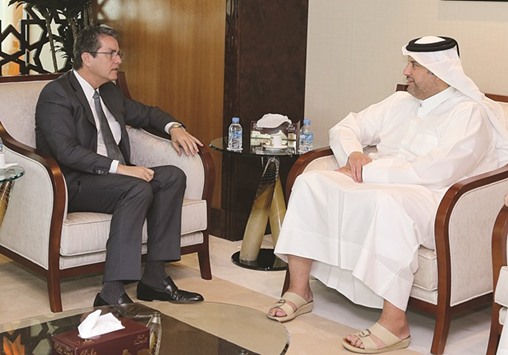The World Trade Organisation (WTO) has asked Qatar to ratify trade facilitation agreement in order to reap the benefits of economic diversification and hoped that Doha will vociferously pitch for tackling the big, outstanding world trade issues.
“By making trade flow more easily, this agreement can also support Qatar’s economic diversification and focus on services. However, in order to benefit from the agreement, first it must be ratified. This is one immediate and very positive step that Qatar could take,” WTO director general Roberto Azevêdo said after his meeting with Minister of Economy and Commerce HE Sheikh Ahmed bin Jassim bin Mohamed al-Thani; chairman of the Qatar Chamber Sheikh Khalifa bin Jassim al-Thani and the national committee for WTO-related affairs.
In light of Qatar’s vision to become a trade and financial hub, reducing the time and cost of moving goods across the border can make a big difference. The WTO’s new Trade Facilitation Agreement, concluded at its Ministerial Conference in Bali in 2013, is designed to help with exactly this problem, Azevêdo said.
Sheikh Khalifa said Qatar attaches great importance to international multilateral trading systems and said the “Doha Works Programme (DWP) is one of our priorities, based on supporting development”.
During the meeting, they discussed several issues of mutual interest, including the need for the member states complete the remaining elements of the DWP.
“As we look ahead to 2016, and beyond, we need to work towards further trade agreements which enhance growth and development in Qatar and across the Gulf Cooperation Council,” Azevêdo said. “It is clear that all of our members want to tackle the big, outstanding trade issues. A debate is currently under way about the precise shape that this work should take,” he said. “After my meetings here today, I am confident that Qatar will make its voice heard in this debate to help us deliver further, much-needed reforms to global trade rules,” he said.
Another area of interest for Qatar is the WTO’s Information Technology Agreement, he said. This pact was expanded by a group of WTO members during the Ministerial Conference held in Nairobi, Kenya, just three months ago.
“This deal will eliminate tariffs on 201 additional IT products, trade in which is worth around $1.3trn each year, that’s 10% of global trade,” said Azevêdo, who also had meetings with private sector representatives.
Terming the Information Technology Agreement as larger than global trade in automotive products; he said the expanded agreement will lower the costs of doing business for companies of all sizes. It will support lower prices - which will help many other sectors using IT products as inputs; and, again, it will help create jobs, he said.
“For Qatar, as a member of the original Information Technology Agreement, this expanded agreement is potentially very fruitful,” Azevêdo stressed.

Azevu00eado in a meeting with HE Sheikh Ahmed. In light of Qatar’s vision to become a trade and financial hub, reducing the time and cost of moving goods across the border can make a big difference, Azevu00eado said.
